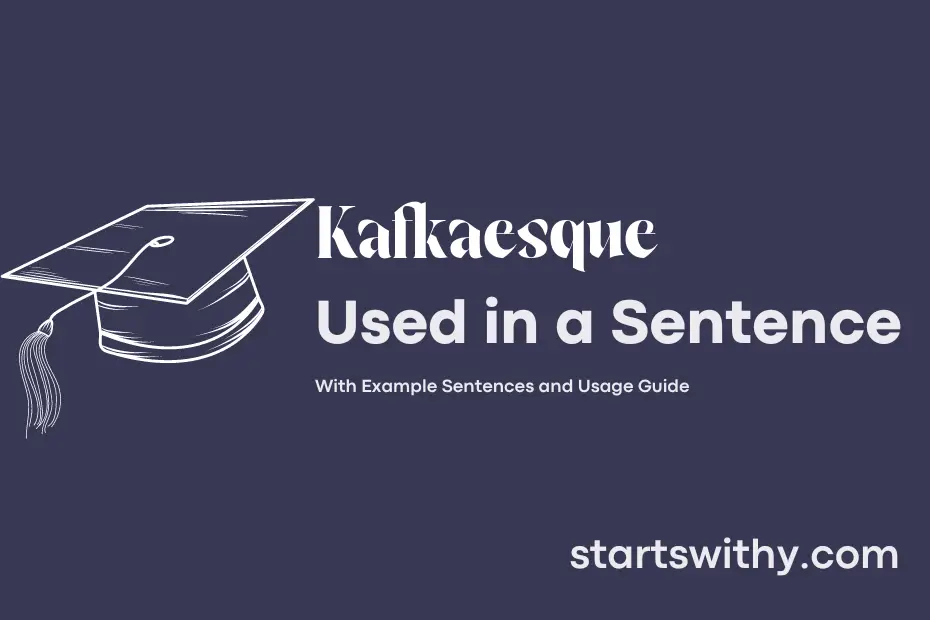Have you ever encountered a situation that felt absurdly disorienting and oppressive, leaving you feeling trapped in a bewildering bureaucratic nightmare? Welcome to the world of “kafkaesque.” This term, derived from the works of renowned author Franz Kafka, describes experiences characterized by surreal complexity, illogicality, and overwhelming complexity.
When something is deemed kafkaesque, it often involves a sense of helplessness or frustration at the hands of an impersonal and irrational system. Whether it’s facing nonsensical red tape in dealing with authorities or navigating a labyrinthine process devoid of logic or reason, a kafkaesque scenario can leave one feeling isolated and powerless in the face of insurmountable obstacles.
7 Examples Of Kafkaesque Used In a Sentence For Kids
- The maze we entered was kafkaesque with its confusing paths.
- The rules at the school seemed kafkaesque because they kept changing.
- The dream I had last night was kafkaesque with its strange creatures.
- The puzzle we tried to solve was kafkaesque with its endless clues.
- The journey through the enchanted forest felt kafkaesque as we couldn’t find our way out.
- The magical potion we brewed had a kafkaesque effect on the flowers in the garden.
- The treasure map we found led us on a kafkaesque adventure to uncover its secrets.
14 Sentences with Kafkaesque Examples
- Kafkaesque administrative procedures left the college students feeling confused and frustrated.
- The long wait times at the university’s financial aid office were truly kafkaesque.
- Kafkaesque group projects with unclear expectations were a common occurrence for the students.
- The never-ending line at the library’s counter felt kafkaesque to the tired students.
- The convoluted and ever-changing academic policies seemed almost too kafkaesque to be real.
- Trying to get a simple signature from the department head turned into a kafkaesque ordeal for the students.
- The labyrinthine corridors of the university building gave off a kafkaesque vibe.
- Facing a kafkaesque dilemma, the students had to choose between attending an important lecture or completing a time-sensitive assignment.
- The convoluted online registration process for courses was nothing short of kafkaesque.
- Dealing with unresponsive professors and unclear feedback on assignments made the academic journey feel kafkaesque for the students.
- The lack of communication between different departments created a kafkaesque situation for the students trying to navigate college bureaucracy.
- Entering the overcrowded and chaotic cafeteria during lunch hour felt like stepping into a kafkaesque nightmare.
- The strict and constantly changing dress code policies at the college were becoming more and more kafkaesque to the students.
- The intricate web of interconnected prerequisites for various courses made the academic planning process seem kafkaesque.
How To Use Kafkaesque in Sentences?
Kafkaesque can be used in a sentence to describe situations or events that are reminiscent of the themes found in the works of Franz Kafka, particularly those involving the absurdity, complexity, and dehumanization of modern bureaucracies.
To use Kafkaesque in a sentence, you can say something like, “The protagonist’s experience with the faceless government agency was truly Kafkaesque, as he found himself trapped in a never-ending cycle of paperwork and contradictory rules.”
When using Kafkaesque, remember that it is used to convey a sense of surrealism, helplessness, and confusion in the face of overwhelming and nonsensical obstacles. It often refers to situations in which individuals feel powerless and overwhelmed by systems or institutions that seem illogical or absurd.
Additionally, Kafkaesque can be used as an adjective to describe a variety of scenarios, from mundane bureaucratic processes to more surreal and nightmarish situations. It is a useful term for capturing the oppressive and disorienting nature of modern life and institutions.
In summary, when you want to convey a sense of absurdity, complexity, and dehumanization in your writing or speech, consider using the term Kafkaesque to evoke the themes and feelings associated with the works of Franz Kafka.
Conclusion
In conclusion, the term “Kafkaesque” is used to describe situations that are reminiscent of the surreal, nightmarish, and illogical elements found in the works of Franz Kafka. These situations often involve bureaucratic complexities, absurdity, and a sense of helplessness or alienation. For example, the individual in a Kafkaesque scenario may find themselves caught in a never-ending cycle of nonsensical rules and procedures, much like the characters in Kafka’s novels.
Overall, when something is described as Kafkaesque, it evokes a feeling of unease, confusion, and the sense of being trapped in a system that is beyond one’s control or understanding. The term has become a powerful descriptor for situations that are bewildering, surreal, and disorienting, reflecting the enduring impact of Kafka’s distinctive literary style on our understanding of the complexities of modern life.



